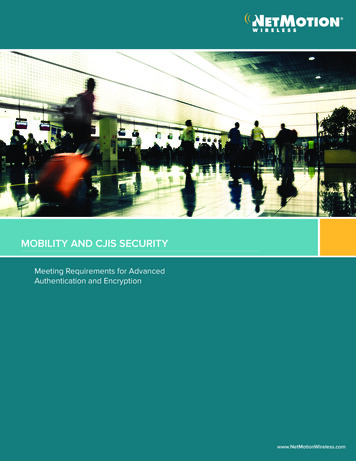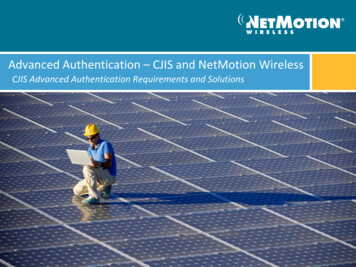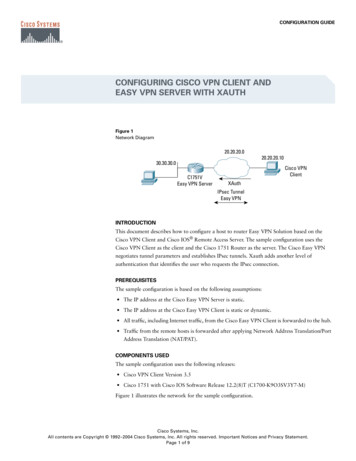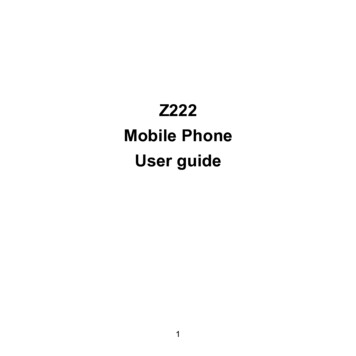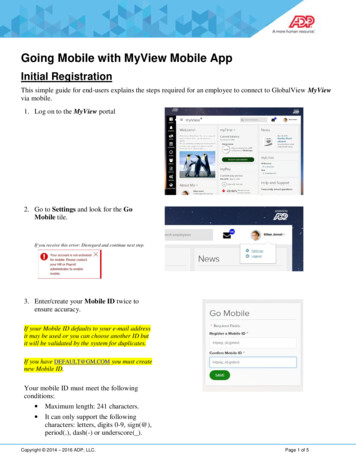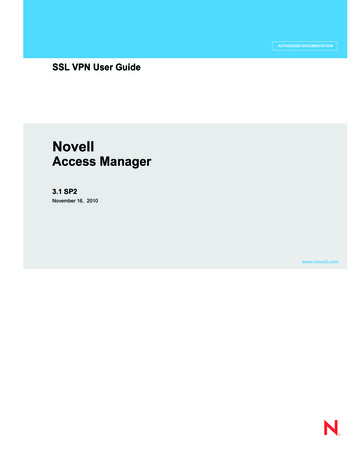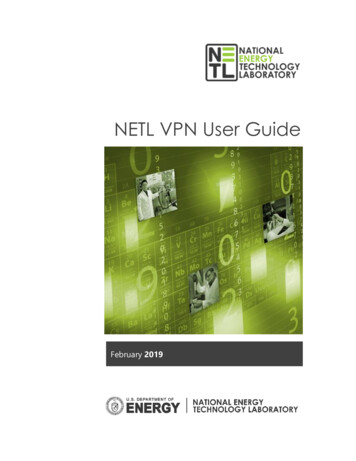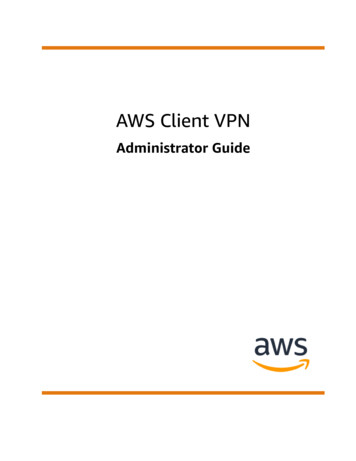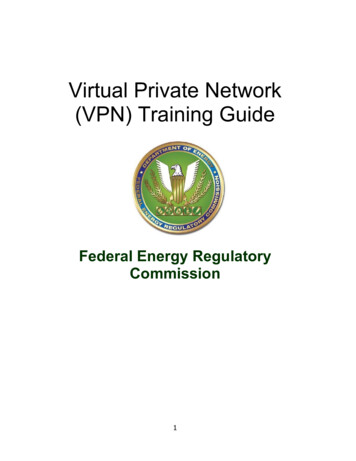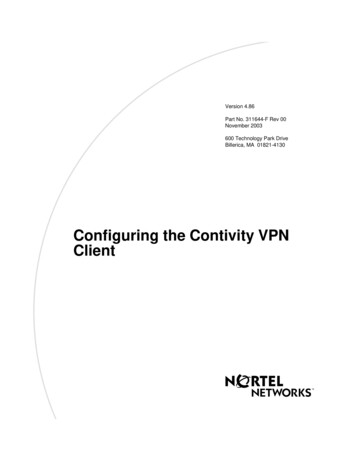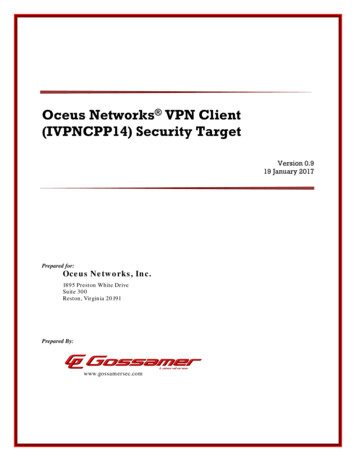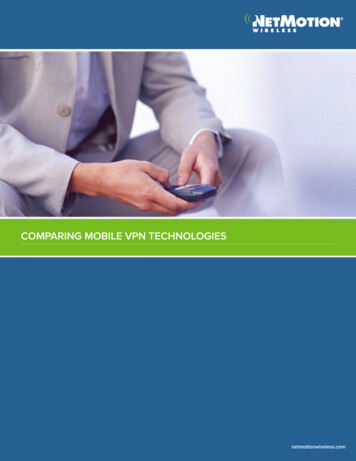
Transcription
COMPARING MOBILE VPN TECHNOLOGIESnetmotionwireless.com
Comparing Mobile VPN TechnologiesExecutive SummaryTraditional approaches for encrypting data in transit such as IPSec and SSL are intended for wired networks withhigh-speed, highly reliable connections. In a mobile wireless WAN environment, where data transmission speedsare slower and connections are less reliable, traditional VPN performance suffers, frequently resulting in applicationfailure, data loss, and reduced productivity. NetMotion Wireless offers a best-in-class mobile VPN built from theground up for mobile, wireless environments.VPN technologies validate the identity of and encrypt the data sent between two or more systems on the Internet.Characteristics of an Ideal Mobile VPNOne of the weaknesses of the original Internet protocol (TCP/IP) is that it does not include a native means forensuring the authenticity and privacy of data as it passes over a public network. To address this weakness, add-onVirtual Private Network (VPN) technologies were developed to validate the identity of and encrypt the data sentbetween two or more systems on the Internet.Conceptually, a VPN is simply a way for two computers or networks to exchange data under the following terms: Each computer must be able to verify the identity of the other. The data that is exchanged must be kept confidential and unchanged in transit. The exchange must be reliable – computers exchanging data must detect when sent data is not received sothat it can be sent again.Mobile VPNs must also take the following into account: Mobile workers often move from the office to a customer site, changing their IP addresses and even thenetworks used to connect to the Internet. If the VPN doesn’t accommodate these changes, a user mustre-establish the connection each time the IP address changes. Mobile workers often need to suspend or hibernate their devices to preserve battery life. The mobile VPNshould automatically resume without user intervention, otherwise applications that require the VPN to functionare likely to fail. Users will lose data and must manually restart both the tunnel and any applications that use it. Mobile workers use cellular data networks characterized by lower throughput, higher packet loss, and highernetmotionwireless.com 866.262.76262 2015 NetMotion Wireless. All rights reserved.
Comparing Mobile VPN Technologieslatency when compared to wired networks. The applications they use are typically written for stable, highspeed, wired networks. Mobile VPNs must shelter those applications from the reality of mobile networkperformance or the application itself will become unstable, leading to data and/or productivity loss.In essence, a mobile VPN bridges the gap between what users and applications expect (and get) from a wirednetwork, and the realities of mobile computing. While resetting user expectations and rewriting applications for themobile environment is possible, it’s more cost-effective to deploy a single solution that takes mobility into account.This paper discusses the strengths and weaknesses of several different approaches to meeting the connectivityneeds of the mobile worker: IPSec client VPNs SSL client (browser-based) VPNs MobIKE (IKEv2) and MobileIP Purpose-built Mobile VPNsIPSec VPNsInternet Protocol Security (IPSec) is the most widelyadopted solution for securing data in transit betweentwo systems. It provides the following: Authentication so that the transmitting andreceiving parties can trust each other A mechanism to negotiate the security algorithmsand keys required to establish point-to-pointsecurityIPSec was originally developed to link privatenetworks together over the wired internet. Integrity checking to ensure the data is not changed en route Encryption of data (privacy) Protection against certain types of security attacks, such as replay attacksIPSec was originally developed to link private networks together over the wired Internet. With the success ofIPSec as a point-to-point protocol for securing data in transit between two wired networks, software clients weredeveloped to connect single computers in the field to the corporate network. IPSec supports port/address-levelaccess controls for traffic within the tunnel, multiple encryption algorithms, and it enjoys broad support acrossplatforms and vendors.IPSec is not, however, well suited for use in mobile and wireless environments because it requires that the IPaddresses of the endpoints remain unchanged. IPSec disconnects the tunnel and requires users to reauthenticatewhen they encounter a coverage gap, move from one network to another, or suspend/resume their laptops. It alsodoes nothing to address the unique performance requirements of mobile networking.SSL VPNsBrowser-based SSL VPN solutions are designed to secure application streams between remote users and anSSL VPN gateway. In contrast to IPSec VPNs, which connect remote devices to trusted networks, SSL VPNsnetmotionwireless.com 866.262.76263 2015 NetMotion Wireless. All rights reserved.
Comparing Mobile VPN Technologiesconnect remote users to specific applications and network resources inside of trusted networks via a Web portalconfigured to proxy the traffic. They secure Web-based traffic and are well suited for communicating to resourcesin a trusted network from non-corporate devices (such as kiosks, Internet cafés, or home computers) using astandard Web browser.SSL VPNs require a client for anything but the most rudimentary connectivity. Before granting access, NACsecurity checks (frequently performed by ActiveX or Java applets) ensure that the remote device is running theproper security software (checking for the latest antivirus definition files, for example). Often, following necessaryremediation steps is time-consuming and even impossible over an unreliable or slow wireless network.Like IPSec VPNs, SSL VPN solutions do not meet all of the requirements for mobile and wireless use. They do nothandle roaming between networks, crossing coverage gaps, or intermittent connectivity: applications crash or datais lost.Other Enabling TechnologiesIKEv2An update to IPSec’s IKE protocol is the IKEv2 Mobility and Multi-homing protocol (MOBIKE). IKEv2 supports amobile device with multiple IP addresses, or addresses that change over time.Since it’s basically a key exchange protocol, IKEv2 does nothing to shield the applications on mobile devices fromcrashing when the device is unreachable (for example, out of range, or in hibernate mode). IKEv2 also can’t doanything to enhance the performance of those applications over the network.Mobile IP VPNsMobile IP solves the problems created when mobile devices change addresses as they roam, by hiding IP addresschanges from client applications. It has no native security functions and relies on another technology, such asIPSec, to keep data confidential and authenticate the identity of the systems participating in the VPN. PairingMobile IP with IPSec for basic security adds to the protocol overhead by requiring the following: IPSec encapsulation for protecting the end-point data Mobile IP encapsulation to hide the address changes A second layer of IPSec encapsulation for Home Agent and other security associationsThis protocol overhead degrades throughput and adds configuration complexity. Like IKEv2, Mobile IP is notoptimized for wireless networks, nor does it offer application persistence through wireless coverage gaps and thesuspend/resume cycles typical of the mobile worker.Password Caching and Automatic ReconnectOne of the problems that IKEv2 and Mobile IP leave unsolved is how to bring the tunnel back up after an interruption.One approach is to simply cache the credentials used to create the tunnel and immediately re-submit them if thetunnel goes down. This approach is simple, effective, and easily understood by most users. Where it falls short,even when combined with technologies such as IKEv2 and Mobile IP, is that applications trying to use the tunnelwhen it is down will crash, taking valuable data with them, not to mention the time it takes to recover.netmotionwireless.com 866.262.76264 2015 NetMotion Wireless. All rights reserved.
Comparing Mobile VPN TechnologiesNetMotion Mobility: A Purpose-Built Mobile VPN SolutionNetMotion Mobility is a standards-based mobile VPN that provides secure, continuous remote access to networkresources and applications from mobile devices over any wired or wireless IP-based network.Unlike traditional IPSec and SSL VPNs, which do not performwell in mobile and wireless environments, and point solutionsthat only solve part of the problem, Mobility was built from theground up to address the unique challenges associated withmobile computing. These include wireless security, coveragegaps, and slow and unreliable networks.The Mobility Mobile VPN enforces security from endpoint to endpoint, regardless of the combination of networksused. It is designed with an understanding of network types, providing a seamless solution for users transitioning fromhome networks to hotspots and to mixed-vendor environments, be they WWANs or WLANs. Although optimized forwireless networks, it also supports any type of network that uses the IP network protocol, including Ethernet, DSL, anddial-up.PersistenceMobility shields applications from changes in the network environment by intercepting network calls from theapplication and proxying those calls through a dedicated server on the core network. The Mobility server provideshighly available and stable TCP connections that shield remote host applications from coverage gaps, addresschanges, and network changes. Mobility also offers enhanced application-based policy management and a secureend-to-end VPN for any application running on the mobile device.RoamingMobility maintains a secure, stable VPN connection as devices roam from one network to another. The tunnelremains available and application sessions persist in many common scenarios, such as: Suspending operation on the mobile device and later resuming it Moving to a different location on the network Connecting a mobile device over slow, bandwidth-challenged, or high-latency networks Encountering interference from microwaves, stairwells, elevator shafts — anything that interferes with radio signals Changing network interfaces (for example, from a WLAN to a WWAN card) Moving across gaps in coveragePerformance OptimizationMobility is designed to provide optimum performance over intermittent and low-bandwidth network links. Itsarchitecture includes enhancements that allow network traffic over IP to more effectively deal with connectivityloss from a mobile device, whether due to coverage outages or external factors, such as power management oruser intervention. It makes the most efficient use of the given bandwidth using advanced features that reduce the“chattiness” of transport protocols:netmotionwireless.com 866.262.76265 2015 NetMotion Wireless. All rights reserved.
Comparing Mobile VPN Technologies Selective acknowledgments Fragmentation optimizations Data and acknowledgment bundling Data compression Message coalescing Error-reduction algorithms Reduced and synchronized retransmissions Web accelerationWorking in concert, these features provide for the efficient movement of data. In addition, Mobility is configured toautomatically switch to the fastest-bandwidth network connection when multiple connections are active.Extensive Platform SupportMobility has extensive platform support, working on the majority of widely-used mobileoperating systems. Mobility fully supports Windows operating systems, including WindowsXP, 7 and 8, and Windows Pro Tablets, as well as all Android devices with Android 4.0 andabove. Mobility also offers an OpenVPN solution to provide basic connectivity for Mac,Linux, and iOS devices.netmotionwireless.com 866.262.76266 2015 NetMotion Wireless. All rights reserved.
Comparing Mobile VPN TechnologiesVPN Feature ComparisonMobilityIP SecSSLStandards-based encryptionYesYesYesFIPS-140-2 validated encryption librariesYesLimitedLimitedStandards-based authenticationYesYesYesIntegration with existing authenticationschemaYesYesYesSupport for CJIS-compliant smart cards andcertificatesYesYesLimitedUser-transparent multi-factor (user anddevice) authenticationYesNoNoEnforced reauthentication without disruptingapplicationsYesNoNoNetwork Access ControlYesLimitedYesQuarantine by device or userYesYesYesDevice-to-DMZ securityYesYesYesCommon Criteria EAL4 YesYesYesNSA Suite BYesYesYesApplication session persistenceYesNoVery LimitedSeamless roaming (slow handoffs — out-ofrange conditions or suspend and resumeoperations)YesNoNoData compressionYesLimitedLimitedLink optimizationsYesNoNoQoS and traffic-shaping supportYesLimitedLimitedWeb image accelerationYesNoNoReal-time application optimizationsYesNoNoTransparency (ease of use)YesNoWeb onlyMicrosoft OS OnlyYesYesFull support for laptops and Windows MobiledevicesYesDepends onvendorLimited onWindows MobileMobile-specific management informationYesNoNoApplication Specific Policy managementYesNoLimitedAnalytics on device / application / network useYesNoNoNAT-friendlyYesDepends onvendorYesSecurityProductivityMulti-platform supportManagementnetmotionwireless.com 866.262.76267 2015 NetMotion Wireless. All rights reserved.
Comparing Mobile VPN TechnologiesConclusionWhile IPSec- and SSL-based client VPN technologies have their place, neither is suitable for the mobile computingenvironment because they fail to address the needs for application performance, usability, and productivity.Organizations investing in mobile computing as a way to improve field worker productivity should deploy apurpose-built mobile VPN solution to secure their remote data communications.The dominant mobile VPN is Mobility —the flagship solution from NetMotion Wireless that is built from the groundup for mobile and wireless environments. Mobility is a mobile VPN designed to deal with wireless security,coverage gaps, roaming, and performance.For More InformationVisit www.NetMotionWireless.com or contact sales@netmotionwireless.com.netmotionwireless.com 866.262.76268 2015 NetMotion Wireless. All rights reserved.
netmotionwireless.comFOR MORE INFORMATION, CONTACT US:United StatesSeattle, WashingtonTelephone: (206) 691-5500Toll Free: (866) 262-7626sales@netmotionwireless.comEuropeGermany and ited Kingdomnortherneurope@netmotionwireless.com 2015 NetMotion Wireless, Inc. All rights reserved. NetMotion is a registered trademark, and NetMotion Wireless Locality , NetMotion Mobility , Roamable IPSec , InterNetwork Roaming , Best-Bandwidth Routing and Analytics Module are trademarks of NetMotion Wireless, Inc. Microsoft , Microsoft Windows , Active Directory , ActiveSync ,Internet Explorer , Windows Mobile , Windows Server , Windows XP , SQL Server , Windows XP Tablet PC Edition and Windows Vista are registered trademarks of MicrosoftCorporation. All other trademarks, trade names or company names referenced herein are used for identification purposes only and are the property of their respective owners.NetMotion Wireless technology is protected by one or more of the following US Patents: 5,717,737; 6,198,920; 6,418,324; 6,546,425; 6,826,405; 6,981,047; 7,136,645; 7,293,107;7,574,208; 7,602,782; 7,644,171; 7,778,260 and Canadian Patent 2,303,987. Other US and foreign patents pending.
SSL VPNs Browser-based SSL VPN solutions are designed to secure application streams between remote users and an SSL VPN gateway. In contrast to IPSec VPNs, which connect remote devices to trust
